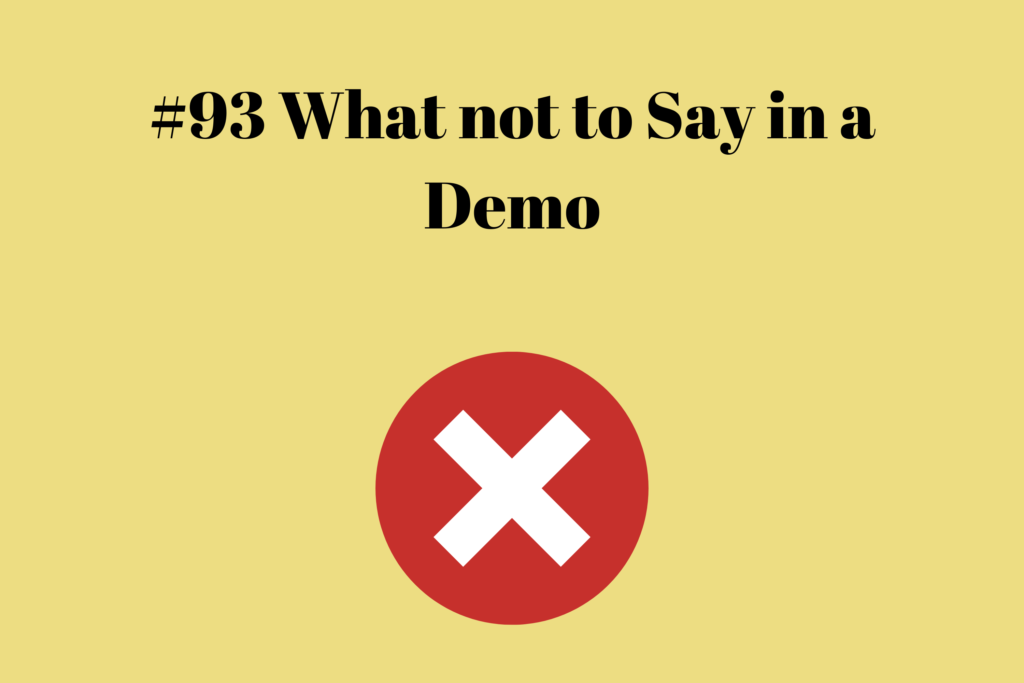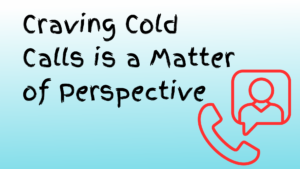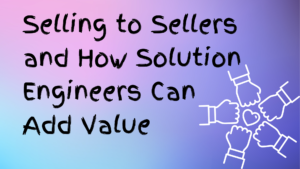
There are a lot of things that are said during demos, some are canned, some are improvised, but all are always geared to get you and your audience in agreement and towards a sale. Not all words are equal however, and there are some words and phrases that can be detrimental to your success. Today we discuss some words and phrases to avoid when you’re demoing.
In this show we will discuss:
What Not To Say During Demos
- “Great Question” after every question.
- Mix it up, save “great question” for the truly great questions.
- Consider other phrases like:
- “That’s something I hadn’t thought about before,”
- “I’m so happy you asked that question,”
- Rephrase their question to show your understanding and clear up any misconceptions.
- “As I said…” or “Obviously”
- Don’t piss off your customer.
- It’s not their job to understand what you’re saying as much as it is your job to explain things in a way they understand.
- If you think things are obvious, obvious to who?
- Leave your sass at the door.
- “I don’t know what that button does.”
- Don’t be caught off guard if your audience asks you a question about something on the screen (even if it isn’t directly related to the topic of conversation).
- Always have a cursory knowledge of everything that can be seen on the screen – just in case.
- You may lose credibility if you show your lack of knowledge about your own tool.
- Your audience may not know anything about your tool, simple answers will satisfy their question in most cases.
- “I don’t want to go into much detail about this,”
- Don’t discount audience questions. If they ask something, you should answer it.
- If the meeting is going over time or the question warrants another whole discussion, consider offering a brief response right away and a follow up discussion to discuss the rest – BUT BEWARE of inadvertently extending the sales cycle.
- Use an “Accordion” style to your demo schedule to accommodate for a dynamic agenda and/or conversations likely to go over-time.
- “The Competitor Doesn’t Do This”
- SaaS as an industry moves fast. Maybe your competitor couldn’t do it yesterday, but maybe they now can, or soon will. How up to date is your competitive intel, how confident are you in it?
- Growing number of smaller competitors with niche offerings that likely compete with portions of your product portfolio.
- Lots of companies have very similar functionality.
- Don’t get embarrassed by bad data/assumptions.
- Don’t be seen as having to rely on bashing the competition, know your value prop and sell it.
- Set subtle traps in your prospect’s mind about the competition by highlighting and emphasizing value that you can provide that you know are competitive advantages. Make them want to ask your competitors about what you’re showing since you know that you’re showing is best.
- Sometimes it’s best not to mention competitors at all, don’t ask don’t tell.
- SaaS as an industry moves fast. Maybe your competitor couldn’t do it yesterday, but maybe they now can, or soon will. How up to date is your competitive intel, how confident are you in it?
- “This feature is amazing/so cool!”
- You may be biased, think about who things are cool to.
- Careful to not over-hype things to have them possibly fall flat.
- If initiated by the customer (them showing excitement over something you’ve shown, it’s much more appropriate to acknowledge their excitement and build on it by showing them things that you know they’ll finder cooler and cooler.
- “It’s easy.”
- You’re in your solution all the time, of course it’s easy for you, what about your audience though?
- You want them to acknowledge how easy things are; don’t tell them, show them so they can tell you.
- If you’re talking to someone who is a bit more combative, they won’t like to be told if things are easy are not, let them decide themselves.
- “I don’t know if you can see this.”
- You’re demoing to your audience, you have to make sure that they can see your screen.
- Confirm with them that they can comfortably see specific things on your screen.
- Do you need to zoom in?
- Can they see the right screen? The right presentation? The right interface?
- “Don’t hurt people, no biting and don’t rip people’s shirts.” – Ramzi’s son.
- Don’t be adversarial on demos.
- Not everyone is going to like your product, that’s okay, don’t take it personally.
- People who are emotional about your product my reveal valuable nuggets of information about either their pains, their relationship with your company or other things.
- Keep a cool head and it will pay off.
- “Great Question” after every question.
Some more links from the show:




This Post Has One Comment
Pingback: #95 The 6 Habits of Highly Effective Sales Engineers | We The Sales Engineers